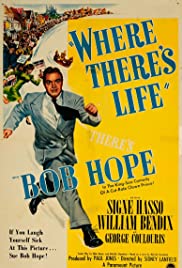
WHERE THERE’S LIFE
US, 1947, 75 minutes, Black-and-white.
Bob Hope, Signe Hasso, William Bendix, George Colouris, George Zucco.
Directed by Sidney Lanfield.
This comedy was typical enough of many Bob Hope features during World War II and in the years afterwards. It was cowritten by Melville Shavelson, a veteran writer for many decades, quite a lot of the star vehicles for Bob Hope at this time, several for Danny Kaye and a number of Warner Brothers musicals from the 1950s. It was directed by Sidney Lanfield who also directed Hope in a number of films in the 1940s, directed films from 1930 to 1952 and then made the transition to a very successful television career including all the episodes of The Addams Family and Mc Hale’s Navy.
Bob Hope plays his usual screen persona, wanting to be dashing, jokes about his fears with the touch of the coward, wanting to be a romantic hero. (And, there is an amusing joke when they pass a poster in the street for Blue Skies with Bing Crosby and Hope’s remark that it was about an old singer before the heroine’s time.)
The film opens in one of those mythical central European small countries, the touch of Ruritania and The Prisoner of Zenda… After the war, the country wants to move to democracy but the King suffers an attempted assassination by a conservative violent group who want to maintain the status quo and their power. It is revealed that the King had a son during a visit to the United States – and, of course, this is Bob Hope, a radio announcer who advertises dog food, has been engaged to his girlfriend Hazel, Vera Marsh, for eight years and is about to get married – and pressurised by his policeman brother-in-law, William Bendix.
The action actually takes place in New York City when the female general, Signe Hasso, goes to find the presumptive heir, along with the group including the Prime Minister (George Colouris who is obviously going to turn out a villain). The other villain is the consul in New York, played by George Zucco.
On the one hand, there is the comedy of the family pursuing Hope, thinking that he is pulling out of the wedding, not believing his story about being the King, about the secret society pursuing him with attempts on his life.
On the other hand, there is going to be a romance with the general, especially when she has to spend the night in hiding in the hotel, wearing one of his shirts. There is a pursuit around the city, especially a long sequence in a department store where the general buys address and Hope is smitten, and a long gag where to escape, he has to pose as a mannequin in a row of them wearing hats, the subject of inspection by a very snooty wife, played by Norma Varden.
There is also a sequence where by mistake, Hope in his attempt to escape from the gang who have imprisoned him in a basement, is mistakenly chosen to be the assassin.
Nothing particularly startling – but a pleasant reminder of Bob Hope, his popularity in films and his comic style.